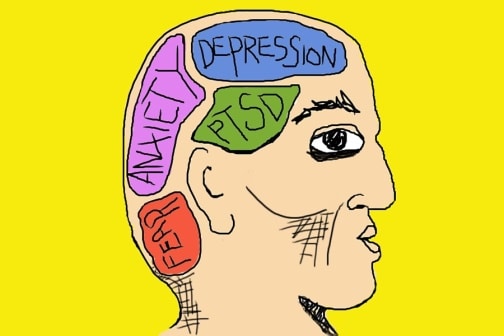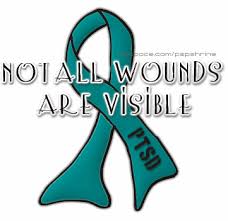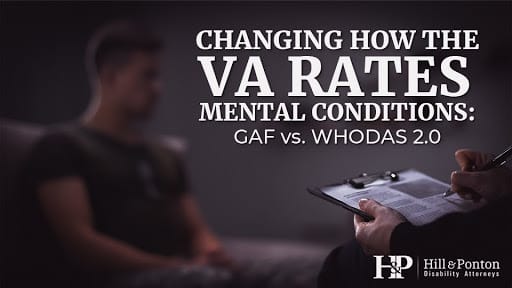As we opened the newspapers the week of March 7th, 2017, we read the tragic story of another veteran who lost his life to desperation and hopelessness. The sad fact is that 22% of all suicides in the United States are veterans and we can prevent this.
The VA Secretary announced on March 8th, 2017 that the VA intends to expand provisions for mental health care to veterans with other than honorable administrative discharges. This is a show of force between the VA and the current administration that suicide is a top priority and shows that there is recognition that suicide among all veterans needs to be addressed by the VA, not just suicides among those with honorable discharges.
This plan will affect over 500,000 veterans who are currently ineligible for treatment because of their discharge status. But what about compensation rights as well?
Mental Health the cause of an OTH Discharge
 For many of these veterans, their mental health issues were the cause of their other than honorable (OTH) discharge. Reviewing the circumstances of the discharge may be required to determine if an in-service event may have led to a mental health condition that, then, in turn, led to actions of behaviors causing grounds for an administrative discharge. Unfortunately, with PTSD and other MH conditions, they do not always manifest the same in every person who experiences them. People also do not always react to the symptoms in the same way. Where one person may become reckless and start drinking and disobeying orders, another may become reclusive and start not showing up for work. Women also experience trauma differently than men, and people who have been traumatized previously again experience symptoms differently than those who are going through a trauma for the first time. Because of these differences, without screening every active duty member and veteran who has been exposed to trauma, we can’t possibly identify everyone who has PTSD or another MH disorder.
For many of these veterans, their mental health issues were the cause of their other than honorable (OTH) discharge. Reviewing the circumstances of the discharge may be required to determine if an in-service event may have led to a mental health condition that, then, in turn, led to actions of behaviors causing grounds for an administrative discharge. Unfortunately, with PTSD and other MH conditions, they do not always manifest the same in every person who experiences them. People also do not always react to the symptoms in the same way. Where one person may become reckless and start drinking and disobeying orders, another may become reclusive and start not showing up for work. Women also experience trauma differently than men, and people who have been traumatized previously again experience symptoms differently than those who are going through a trauma for the first time. Because of these differences, without screening every active duty member and veteran who has been exposed to trauma, we can’t possibly identify everyone who has PTSD or another MH disorder.
And we need to, identify everyone. Why? Because of what happened on March 7th, 2017, and every other day that over 20 veterans are committing suicide in this country. PTSD and other MH conditions, while not the cause of the suicides, increase the risk that someone who is experiencing frustration with jobs, family relationships, of the VA system itself is more likely to give up than seek help. It has been shown that the suicide rates among veterans who receive services from the VA are markedly decreased compared to those veterans who do not receive services (VA Benefits and Suicide among Veterans). This proposed change by the VA Secretary and the administration of allowing OTH discharged veterans receive mental health care at VA facilities is a step in the right direction at reducing the suicide rates among our most valued heroes.
What You Can Do
 If you know of a veteran who has been exposed to trauma, even if they do not seem to exhibit symptoms of PTSD or any other mental health disorder, please try to get them to get screened for services. Often times PTSD does not manifest immediately, it can sometimes take months or even years for symptoms to get to the point where the veteran is no longer able to control them or keep them hidden from others. This does not mean that all veterans who experienced trauma have a mental health condition, but it does mean that they should get checked at least as a preventative measure to ensure they are not at risk. Often times veterans will be screened and not even realize some of the things they are going through are symptoms of PTSD. Four out of five Vietnam Veterans experience PTSD symptoms 25 years post-war. This needs to be addressed and they need to be helped.
If you know of a veteran who has been exposed to trauma, even if they do not seem to exhibit symptoms of PTSD or any other mental health disorder, please try to get them to get screened for services. Often times PTSD does not manifest immediately, it can sometimes take months or even years for symptoms to get to the point where the veteran is no longer able to control them or keep them hidden from others. This does not mean that all veterans who experienced trauma have a mental health condition, but it does mean that they should get checked at least as a preventative measure to ensure they are not at risk. Often times veterans will be screened and not even realize some of the things they are going through are symptoms of PTSD. Four out of five Vietnam Veterans experience PTSD symptoms 25 years post-war. This needs to be addressed and they need to be helped.
What about that OTH Discharge?
Veterans with an OTH discharge, while they will be eligible for MH services in the future under the new plan, will not be eligible for compensation benefits due to the character of their discharge. However, if the veteran feels that they were discharged due to the effects of a traumatic experience and the mental health symptoms that arose from that trauma, they can file an Application for the Review of Discharge or Dismissal from the Armed Forces of the United States. The veteran will need to prove their case with documentation so having any medical records, evidence of a traumatic event or statements from witnesses, treatment for your mental health issues, and possibly a statement from your doctor that links your mental health condition to the traumatic event and the behaviors in-service that led to the discharge would be very helpful in supporting the case. They may also retain assistance from a representative from a local veteran organization. If the veteran is able to change their discharge character to “other than dishonorable” or “general” then the veteran will be eligible to file for compensation benefits for the disability caused by the trauma experienced in-service.



